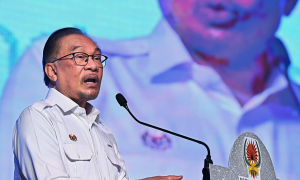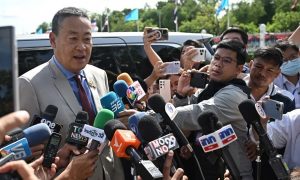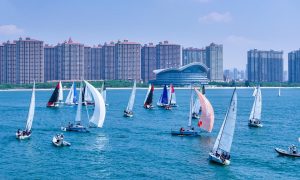MALAYSIANS FROM ALL WALKS OF LIFE WILL CELEBRATE National Day (Hari Merdeka) on August 31. This occasion is a poignant moment for Malaysia, as the country has achieved independence from colonial rule for 47 years. It is a time for many to reflect on the past and how the past has shaped the country, leaving behind legacies for the next generation. Malaysia, truly a country rich with heritage and diversity, is what it is today because of its wealth of history.
August 31. This occasion is a poignant moment for Malaysia, as the country has achieved independence from colonial rule for 47 years. It is a time for many to reflect on the past and how the past has shaped the country, leaving behind legacies for the next generation. Malaysia, truly a country rich with heritage and diversity, is what it is today because of its wealth of history.
Malaysia’s history can be said to date from the period of the Malacca Sultanate founded just before 1400 A.D. Malacca was founded by Parameswara, a prince from Palembang who initially discovered Temasik (which he called Singapura). He was then forced to flee from Singapura by the Srivijayan forces and moved to Malacca. The increase in the spice trade turned Malacca into one of Southeast Asia’s leading ports. Subsequent alliances with China and Arabia brought these traders together in Malaysia, initiating the unique Chinese-Arab cultural blend. The spread of Islam within the archipelago is attributed to the Muslim traders, mainly from India, who came to trade. Parameswara also converted to Islam and became the first Sultan of Malacca.
Malacca’s spice trade led to its attack by the Portuguese, under Alfonso de Albuquerque in 1511, resulting in the fall of the Sultanate. Portuguese’s rule of Malacca adds another influence to the cultural mix. In 1641, however, it fell to the Dutch, who replaced the Portuguese as the leading European trading power in the region. Meanwhile, the British consolidated their hold on the Malay states following Francis Lights’s arrival in Penang in 1786. The British became active in the area in the 18th century because they sought trade. The Sultan of Kedah, looking for help against the Thais, leased the island of Penang to the English East India Company in 1786. And Sir Thomas Stamford Raffles, a company administrator, founded Singapore in 1819. In time, the British, turning Penang into a thriving port, gradually supplanted the Dutch.
In 1824, Britain acquired Malacca from the Dutch in exchange for Bencoolen in Sumatra. Two years later, Penang, Malacca and Singapore became collectively known as the Straits Settlements and were administered by Britain. In 1895, the Federated Malay States, made up of Pahang, Negeri Sembilan, Perak and Selangor were established. British advisors were appointed to counsel the Sultans on all matters except those touching on the Islamic religion and customs.
 By 1909, the northern Malay states of Kedah, Perlis, Kelantan and Terengganu – previously under Thai control – were brought into the colonial fold, along with Johore. These states were grouped together as the Unfederated Malay States. It was under British rule that immigrants from India were brought over to work in the rubber industry in 1910. Its growth led to a second wave of immigration of Indians to build roads, railways and communication systems. The Chinese were brought in to serve in the tin mining industry.
By 1909, the northern Malay states of Kedah, Perlis, Kelantan and Terengganu – previously under Thai control – were brought into the colonial fold, along with Johore. These states were grouped together as the Unfederated Malay States. It was under British rule that immigrants from India were brought over to work in the rubber industry in 1910. Its growth led to a second wave of immigration of Indians to build roads, railways and communication systems. The Chinese were brought in to serve in the tin mining industry.
The 1940s saw the beginning of nationalism and anticolonialism rule in the country. In 1946, the British created the Malayan Union, which effectively transferred all powers from the Malay Rulers to the British. However, the Malayan Union was abandoned in 1948 following strong opposition from the nationalists. The Federation of Malaya (which occupied what is now West Malaysia) was formed in 1948. Under the Federation, the Malay Rulers remained sovereign in the Malay states.
The Alliance, the dominant political party that emergedin the 1950s, was multiethnic in its leadership but also ensured separate representation of ethnic groups through 3 component parties: the United Malays National Organisation (UMNO), the Malayan Chinese Association and the Malayan Indian Congress. The Alliance won an overwhelming victory in the first nationwide elections in 1955. The President of UMNO, Tunku Abdul Rahman, became the Chief Minister.
The Reid Commission was set up to draft a constitution providing for self-government and independence within the Commonwealth. The Federation of Malaya achieved its independence from Great Britain on August 31, 1957. On this day, proud Malaysians converged at the Merdeka Square (or Independence Square), to mark the country’s liberation from colonial rule, and Tunku Abdul Rahman became the first Prime Minister. Tunku is still fondly known as Bapa Malaysia (the father of Malaysia).
Meanwhile, the government had also been fighting Communism since 1948. When the Federation of Malaya became independent in 1957, they continued to fight for Communist rule. This subsequently led to the declaration of a state of emergency. The Emergency lasted for 12 years and was lifted in 1960. In 1963, Malaysia was formed with the admission of Sabah and Sarawak. Singapore however, chose to withdraw from the Federation in 1965 to become an independent government.
Since then, there has been no turning back for Malaysia. The country prospered and developed under the leadership of Tunku, followed by his successors – Tun Abdul Razak Hussein, Tun Hussein Onn, Tun Dr Mahathir Mohamad and now Datuk Seri Abdullah Ahmad Badawi. The leaders of the country have helped steer the nation towards progress and advancement. Remnants of Portuguese and Dutch rule still stand today, leaving behind historical sites that have become major tourist attraction in Malaysias. Even a small but significant Portuguese and Dutch community still survives in  Malacca.
Malacca.
The British influence can also be seen in every aspect of Malaysian life – from the legal system to the economical aspect of the country. The Chinese and Indian immigrants today form part of the triumvirate that constitutes the majority of the country’s multi-ethic and multi-religious population. With inter-marriages and a fusion of cultures stemming from the country’s past, Malaysia has become a melting pot of people. And that is the wonder of Malaysia. Malaysia has come a long way. Having overcome political upheavals – the National Day celebrations, is a momentous occasion for Malaysia. Today, National Day in the country is commemorated with parades and processions and variety shows held at various state levels nationwide.
On the eve of Independence Day, crowds gather at Merdeka Square for the exciting countdown to midnight. And on that special day, Kuala Lumpur will be alive with activities as the national day festivities are held on a grand scale.
This article was written by Devi Manjit for the August 2004 edition
This article was edited for ExaptGo.com
Get your free print subscription and free delivery at http://www.theexpatgroup.com/magazine_subscription.php
"ExpatGo welcomes and encourages comments, input, and divergent opinions. However, we kindly request that you use suitable language in your comments, and refrain from any sort of personal attack, hate speech, or disparaging rhetoric. Comments not in line with this are subject to removal from the site. "



















